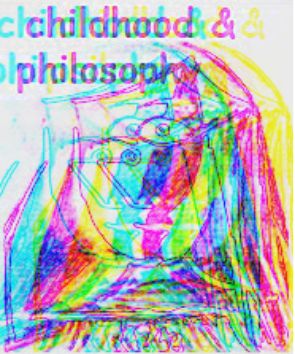multidimensional thinking: towards a more complex and human understanding of rationality
DOI:
https://doi.org/10.12957/childphilo.2024.82118Keywords:
pensamiento multidimensional, racionalidad, complejidad, razonabilidad, LipmanAbstract
This article proposes an approach to Matthew Lipman’s philosophical-pedagogical thesis about the multiple transactive dimensions of thinking, namely, critical, creative, and caring thinking. Our goal is to highlight the way in which Lipman’s proposal supports a more complex and humanistic type of rationality. We argue that the interaction and reciprocity that occurs between the three dimensions allows for the emergence of a higher order thinking, namely, reasonableness, which is nothing other than a complex form of rationality, capable of recognizing plurality and diversity. Indeed, this is a rationality that aims to overcome the limitations of prevailing thought, with the intention of avoiding unilateralism, instrumentalism, and scientism. Lipman, the pioneer of the Philosophy for Children Program, affirms that the attainment of reasonableness should be the goal of any educational process; hence, he takes on the task of forging a philosophical-pedagogical proposal, which will be the basis for the deployment of higher thinking skills, and that will also be essential for the construction of a high-quality democracy.
Downloads
References
ACCORINTI, Stella. Filosofía para Niños: introducción a la teoría y la práctica. Buenos Aires: Ediciones Manantial, 2015.
BARRIENTOS, José. La Filosofía para Niños y Jóvenes como prevención y antídoto frente a los discursos de odio. Isegoría, Madrid, v. 67, n. 67, p. 1-13, 2022. DOI: https://doi.org/10.3989/isegoria.2022.67.02. Disponible en: https://isegoria.revistas.csic.es/index.php/isegoria/article/view/1224. Acceso en: 11 abr. 2024.
BLOOM, Benjamin. Taxonomía de los objetivos de la educación. Traducción de Marcelo Pérez Rivas. Buenos Aires: El Ateneo, 1990.
BUCHLER, Justus. Toward A General Theory Of Human Judgment. Sheridan: Creative Media Partners, 2022.
FERRER, Virginia. Introducción. En: FERRER, V. (Ed.). Lipman, M. Pensamiento complejo y educación. Madrid: Ediciones de la Torre, 2001. p. 11-28.
GÓMEZ, Manuela. Pensamiento multidimensional y práctica filosófica según Matthew Lipman. En: DUTHIE, E.; GARCÍA MORIYÓN, F.; ROBLES LORO, R. (Eds.). Parecidos de familia. Propuestas actuales en Filosofía para Niños. Madrid: Anaya, 2018. p. 266-272.
LIPMAN, Matthew. Rediscovering the Vygotsky Trail. Inquiry: Critical Thinking Across the Disciplines, Montclair, v. 7, n. 2, p. 14-16, 1991.
LIPMAN, Matthew; SHARP, Ann Margaret; OSCANYAN, Frederick. La filosofía en el aula. Traducción de Eugenio Echeverría, Magdalena García, Félix García Moriyón y Teresa de la Garza. Madrid: Ediciones de la Torre, 1992.
LIPMAN, Matthew. Pensamiento complejo y educación. Traducción de Virginia Ferrer. Madrid: Ediciones de la Torre, 2001.
LIPMAN, Matthew. El lugar del pensamiento en la educación. Traducción de Manuela Gómez Pérez. Barcelona: Octaedro, 2016.
MANNHEIM, Karl. Ideología y utopía. Traducción de Salvador Echavarría. México: FCE, 1990.
MEAD, George. Espíritu, persona y sociedad. Traducción de Florial Mazía. Barcelona: Paidós, 1973.
MISSIMER, Connie. Why two heads are better than one: philosophical and pedagogical implications of a social view of critical thinking. En: WALTERS, K. (Ed.). Rethinking reason: New perspectives in critical thinking. Albany: State University of New York Press, 1994. p. 119-134.
NEWMANN, Fred. Higher Order Thinking in the High School Curriculum. NASSP Bulletin, Reston, v. 72, n. 508, p. 58-64, 1988.
NUSSBAUM, Martha. Paisajes del pensamiento. Traducción de Araceli Maira. Barcelona: Paidós, 2008.
PADILHA, Leoni. El cuidado en la educación: análisis desde la perspectiva lipmaniana. UNICA, Maracaibo, v. 12, n. 2, p. 47-61, 2011.
PAUL, Richard; ELDER, Linda. La mini-guía para el pensamiento crítico, conceptos y herramientas. Santa Bárbara: Fundación para el Pensamiento Crítico, 2003. Disponible en: https://www.criticalthinking.org/resources/PDF/SP-ConceptsandTools.pdf. Acceso en: 7 ago. 2022.
PINEDA, Diego. Reflexiones en torno a la creatividad en perspectiva lipmaniana. UNICA, Maracaibo, v. 12, n. 2, p. 130-159, 2011.
RAWLS, John. Liberalismo político. Traducción de Sergio Madero. México: FCE, 2006.
RESNICK, Lauren. La educación y el aprendizaje del pensamiento. Traducción de Miguel Wald. Buenos Aires: Aique, 2000.
ROJAS, Víctor et al. Filosofía para niños. Un proyecto para aprender a filosofar. Haser, Sevilla, v. 15, n. 15, p. 153-199, 2024. DOI: https://doi.org/10.12795/HASER/2024.i15.05. Disponible en: https://revistascientificas.us.es/index.php/HASER/article/view/25210. Acceso: 15 abr. 2024.
RYLE, Gilbert. Thinking and Self-Teaching. Journal of Philosophy of Education, Oxford, v. 5, n. 2, p. 216-228, 1971. DOI: https://doi.org/10.1111/j.1467-9752.1971.tb00457.x. Disponible en: https://onlinelibrary.wiley.com/doi/abs/10.1111/j.1467-9752.1971.tb00457.x. Acceso en: 15 sep. 2023.
RYLE, Gilbert. Dilemas. Traducción de Hugo Margáin y Enrique Villanueva. México: UNAM, 1979.
SÁTIRO, Angélica. Creatividad y educación reflexiva: un artículo para dialogar. En: FRESQUET, A.; PORCAR, M. (Comps.). Construir, deconstruir, reconstruir. Mendoza: Editorial de la Facultad de Educación Elemental y Especial, 2005. p. 75-90.
SHAPIRO, Carmina. El lugar de la deliberación en la filosofía para niños de Lipman. Childhood & Philosophy, Río de Janeiro, v. 15, p. 1-18, 2019. DOI: https://doi.org/10.12957/childphilo.2019.42723. Disponible en: https://www.e-publicacoes.uerj.br/childhood/article/view/42723. Acceso en: 17 abr. 2024.
VYGOTSKY, Lev. Pensamiento y lenguaje. Traducción de José Tosaus. Barcelona: Paidós, 2010.
WOLF, Arthur. Affect and Philosophical Inquiry with Children. Childhood & Philosophy, Río de Janeiro, v. 20, p. 1-25, 2024. DOI: https://doi.org/10.12957/childphilo.2024.79302. Disponible en: https://www.e-publicacoes.uerj.br/childhood/article/view/79302. Acceso en: 19 abr. 2024.
YOOS, George. A Work of Art as a Standard of Itself. The Journal of Aesthetics and Art Criticism, Denver, v. 26, n. 1, p. 81-89, 1967. DOI: https://doi.org/10.2307/429246. Disponible en: https://www.jstor.org/stable/429246. Acceso en: 1 sep. 2023.




